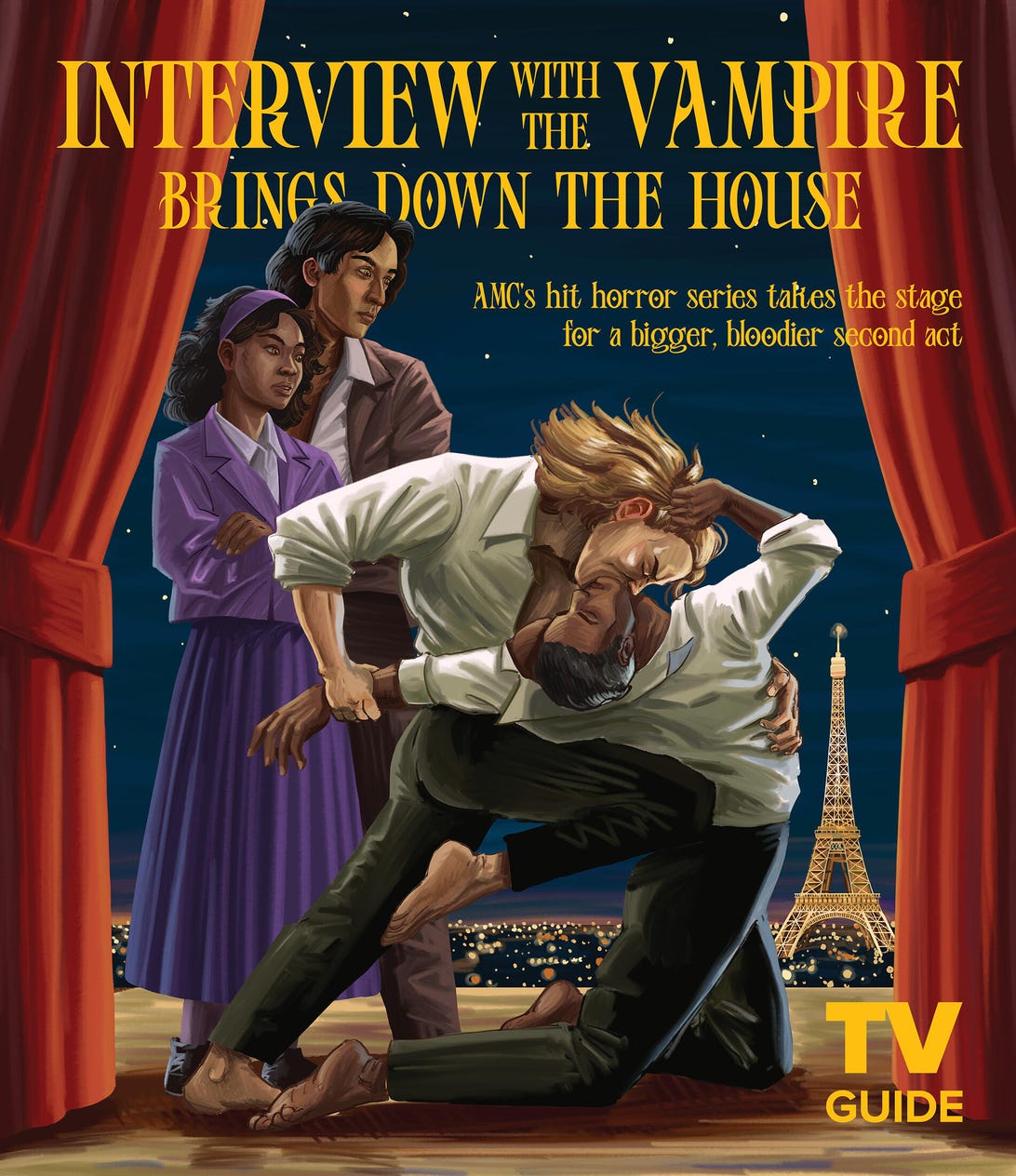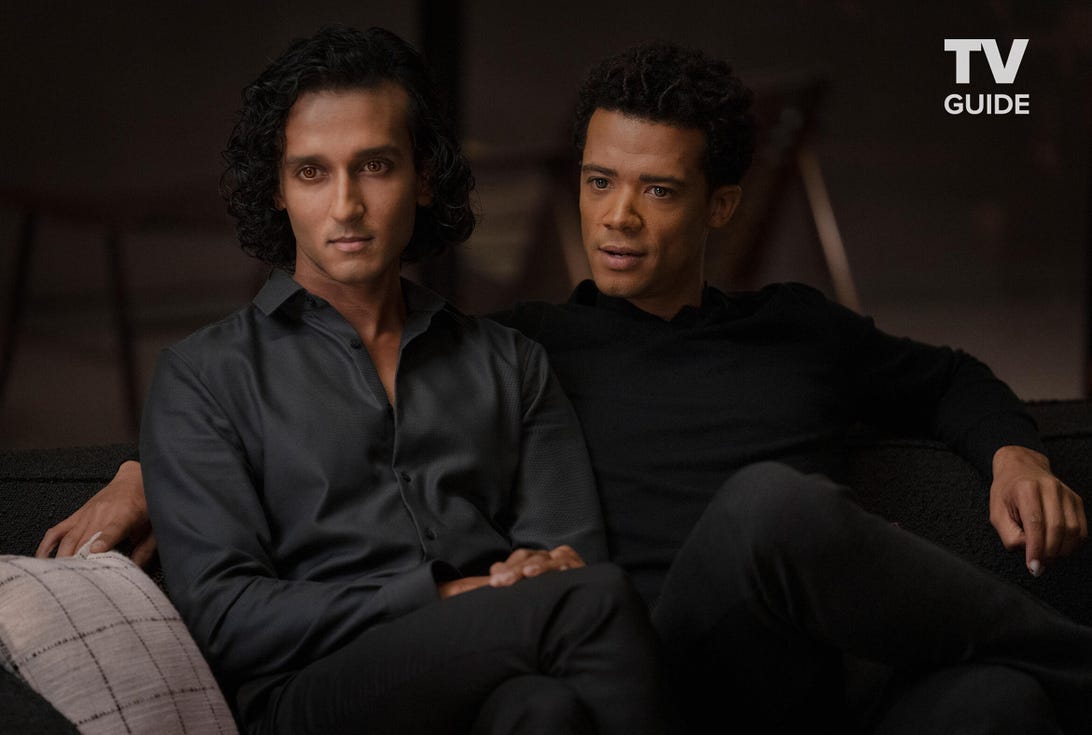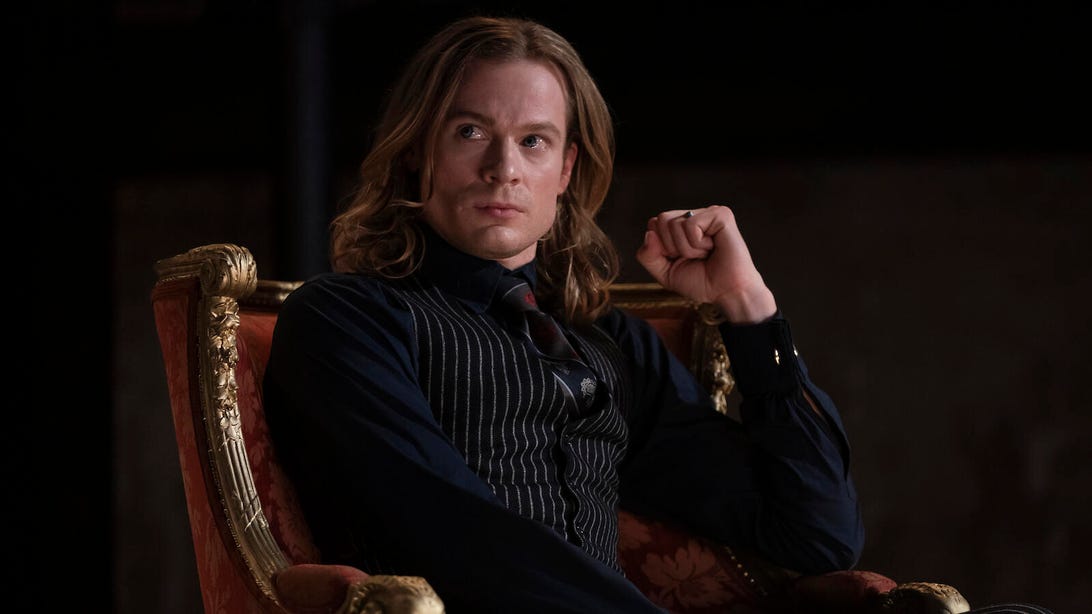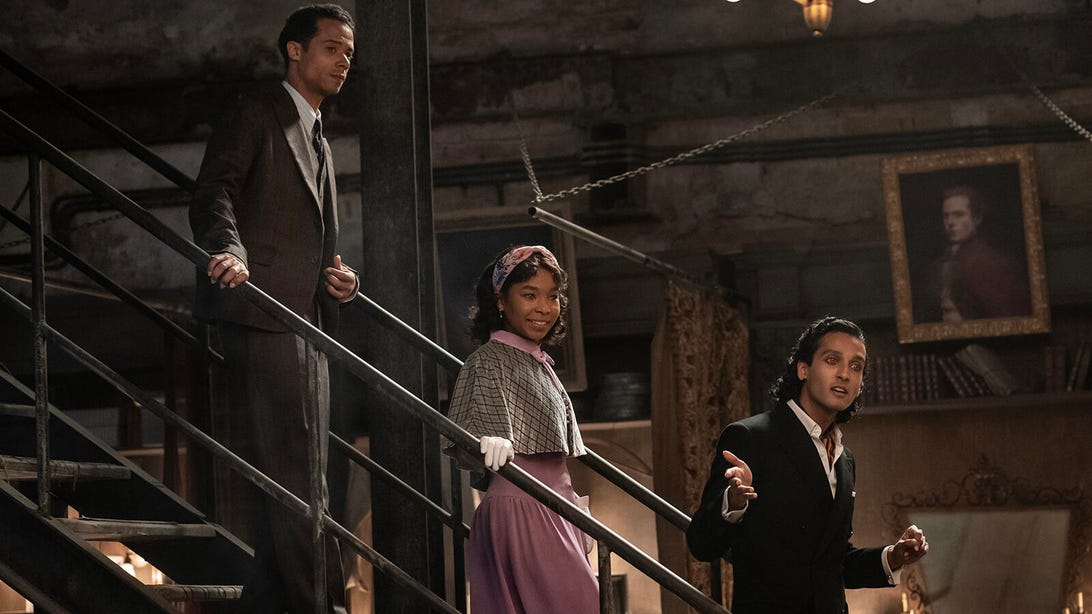
Interview with the Vampire Returns Once More, With Feeling
AMC's Anne Rice adaptation is a monster hit. The team behind this spring's most anticipated show previews its showstopping second season.
Rolin Jones knows this has all been done before. His eclectic list of references for Interview with the Vampire — the AMC series he created and executive produces, based on Anne Rice's seminal gothic book series The Vampire Chronicles — includes Amadeus, Ordinary People, Good Will Hunting, An American Werewolf in London, and Barbara Walters' 1988 interview with Mike Tyson and Robin Givens. That Interview with the Vampire itself has been adapted before, in the form of Neil Jordan's 1994 film starring Brad Pitt and Tom Cruise, goes without saying. But Jones is focused on making the show stand out in other ways. "We're not the giant intellectual show," he told TV Guide. "But we try to out-feel anybody on TV."

Click through for the latest on spring TV
"The feelings show" might be the most apt way of describing Interview with the Vampire. Yes, it's a show about immortal supernatural beings who maim and kill and torture, but it's also about a big, messy group of frenemies and all the big, messy feelings that go along with that. When the series premiered on AMC in 2022, critics and viewers marveled at its unambiguous depiction of the queer themes from Rice's books (the same cannot be said of the film) and at how gracefully it breathed life into a decades-old story with the decision to cast Jacob Anderson, a Black actor, as Louis de Pointe du Lac, a character originally written as a white plantation owner. As Rice wrote it, the vampire Lestat turned Louis because he was compelled by his beauty and his plantation; in the series, Lestat (played by Sam Reid) is appalled by the way Louis has been "picked clean" by early 1900s white society and sees vampirism as a method of propelling Louis toward his true power.
In Season 1, the series made a meal out of Louis and Lestat's calamitous relationship, in all of its passionate highs and violent lows. Lestat's lack of understanding for how racism has affected the lives of Louis and their pseudo-daughter Claudia (played in Season 1 by Bailey Bass, with Delainey Hayles set to step into the role in Season 2) was, in part, what led to his downfall in the first season finale, which found Louis and Claudia leaving Lestat for dead. But that wasn't exactly the whole story, as the journalist Daniel Molloy (Eric Bogosian) deduced in present-day Dubai, where Louis' recounting of his life story played out as a backdrop to the season.
Gorgeously melodramatic and brazenly sexy in an era when film and television are increasingly sexless, Interview with the Vampire is the series that dares to do it all. As Inkoo Kang wrote for the New Yorker, "Blood and fangs aside, Interview would be compulsively watchable were it merely a study of a toxic interracial relationship." The show nimbly weaves race, queerness, and vampirism together, never losing sight of everything it so wholly committed to in its first episode. "I've seen it in plenty of other shows where these topics get touched on, but they don't know what they're talking about, and they haven't been serious enough about it," said Bogosian. Taking those ideas seriously is exactly how the series gets to the feelings.

Season 2, premiering on AMC and AMC+ on Sunday, May 12, adapts the second half of Rice's first novel, which focuses on the pivotal Paris chapter of Louis and Claudia's lives and embeds them among the legendary Théâtre des Vampires troupe. Jones views the first two seasons as a complete package, noting that many of the decisions made in Season 1 — such as the choices to age up both Claudia and Molloy — were made with the intention of creating a satisfying arc across 15 episodes. (Season 1 was composed of seven episodes; Season 2 will have eight.) The show will grow and expand in its upcoming chapter, as Hayles debuts her take on Claudia and Assad Zaman moves into a starring role after spending much of Season 1 lurking in the shadows as Louis' houseman Rashid, before his character's true identity as the vampire Armand was revealed in the finale. (We'll finally meet Real Rashid — the character's official name — this season, played by Bally Gill.) Characters from the book are to be integrated into the world of the series, like the vampire Santiago, played by Ben Daniels, and Parisian dressmaker Madeleine, played by Roxane Duran. David Costabile joins the cast as a "seasoned TV personality" who crosses paths with Daniel, and Justin Kirk will appear in an undisclosed role, though a quick round of internet sleuthing will make you privy to plenty of theorizing on that. While Jones referred to the first season as "a chamber drama," with much of the action happening in Louis, Lestat, and Claudia's New Orleans townhouse, director Levan Akin — who was behind the Season 1 highlight "Like Angels Put in Hell by God" and returns to direct four episodes of Season 2 — describes the forthcoming season as such: "If Season 1 felt very epic, very sweeping and big, it still feels very intimate compared to Season 2. I think Season 2 really just blows it open."
TV Guide's Complete Guide to Spring TV
The last time we saw Louis, he was in Dubai, white-knuckling Armand's hand as they stood in front of a bewildered Daniel. "I'd like you to meet the vampire Armand," he said. "The love of my life." Season 2 picks up not long after that revelation, with Louis and Daniel resuming their interview as Louis explains how he and Claudia clawed their way out of wartorn 1940s Eastern Europe to get to Paris in search of an elusive community of vampires. Now, though, there's the added presence of Armand, who presides over the narrative and frequently interjects his opinion, all while declining to go on the record (at first, anyway). Louis is still fighting to get to something, to unlock the memories that have curiously evaded him. "The pursuit of memory and truth is the driving force this season. It motivates Louis to get to where we're going to get to by the end of it," said Zaman. "Season 1 proved that his memory's completely shot in lots of ways, but who, or what, did that — that's the question I think we're going to have to answer."
According to Jones, the show's focus on the spotty and personal nature of memory originates not only from Rice's novel but from the curiosity among the writers about the things that go unsaid within it. "What we really embraced on reading the book was that [Louis] was hyper detailed about certain things, and then some other things, he was not," Jones said. That's why the show's titular interview functions as an anchor for the rest of the story, and why the series made the early decision to upgrade Molloy to a major player. "That character disappears from the book for 200 pages. He doesn't even go, 'What happened next?'" Jones said. But the propulsion of the show hinges on Daniel agreeing to a do-over with Louis after their first meeting went so disastrously in 1973. "Everyone needs to be there for a reason," Jones said. "Once you come up with the conceit of, 'Oh, it's the second interview,' you better have some real good answers about why it's the second interview."
Dubai is the area of the series where the most objective truths can emerge amid all the faded memories and obfuscation of facts. It all begins with Louis, a textbook unreliable narrator, though Jones and Anderson both bristle a bit at the term. "One self delusion knits itself to the rest of your life," Jones said. He argued that Louis' memory might be "80-90 percent" correct, though it only takes one mistaken detail to muddle a timeline and cancel someone out entirely. "To unwind that, you call into question all this stuff. It doesn't mean that all this stuff isn't right. It's just this thing has altered it a little bit."
To Anderson, Louis' unreliability matters less than the vivid reality of his feelings. "It's not necessarily that Louis is a quote-unquote unreliable narrator," he said. "He is, because what he's saying is completely subjective. But I think it has just as much to do with how something felt, the feeling of a person or the feeling of an experience, than it is him actively trying to deceive anybody." That comes out most strongly in Dubai, particularly in the second season. "He's really, genuinely trying to find the closest thing to an objective recalling of events that he possibly can."

Assad Zaman and Jacob Anderson, Interview with the Vampire
Larry Horricks/AMCFor his part, Anderson's heard it all. "I've had a lot of that — like, 'Louis' full sh--,'" he said. But if Anderson doesn't believe in the sincerity of Louis' emotions, the show falls apart. On Interview with the Vampire, his performance is an acting hat trick. The character has changed enormously over the decades; by Anderson's own estimation, he's played five different versions of Louis so far. When Season 2 begins, Louis has been shattered across two timelines. "He's reached a level of exhaustion and misery that changes a person," Anderson said. The hedonistic freewheeling of his life in New Orleans has disappeared under the weight of the things Louis saw in Europe during the war — and did before he fled America.
The Season 1 finale was a twisty, bloody slaughter that concluded with Daniel wringing a kernel of truth out of his interview subject: Louis ultimately couldn't see through his and Claudia's elaborate plan to kill Lestat. Slitting his companion's throat but unable to burn him, Louis loaded Lestat's body up in a trunk and sent him away to the dump, leaving him to subsist on a diet of rats in an evocation of everything he once mocked Louis for. ("You didn't kill Lestat," said Molloy. "You spared him out of some f---ed up idea you had about love.") Still, that cop-out landed with sobering finality. "Whether [Lestat] thought he was going to die or not doesn't really matter," said Reid. "I think… you have died. Louis' killing you, you died. You're dead. The act alone is a breakup in itself."
That ending introduced a unique challenge going into Season 2: How do you integrate Lestat, the show's most conspicuous character, into a narrative that he isn't physically present for? As producer Mark Johnson put it, "To what degree can you not have Lestat in a second season? What part of an audience is saying, 'Wait a minute, where's our co-lead?'" Jones agreed: "There's a practical ask, which is that AMC is like, 'We got Sam Reid. Do something with him. You're gonna do a show without this guy? Are you nuts?'" Rice's writing was of little help here, Jones said. "For like, two days, you hold up the book like, 'Did you read your book? He's not in it. He's not in it, except for 10 pages here.'"
But the writers make a deliberate choice to not withhold him. To describe exactly how Lestat appears would be too big a spoiler, but it all goes back to the inner workings of Louis' psyche. "I like writing for Sam Reid, and I think in terms of how this thing is structured and what's going on in this headspace, it wasn't a big leap to go, 'Oh, he's haunting. He's inside Louis,'" Jones said. When we see Lestat at the beginning of the season, he manifests as what Anderson and Reid referred to as "dream Lestat" — not quite himself, not quite a ghost, not quite a memory, but some blend of all three, filtered through Louis' guilt and grief.
"Who is Louis remembering, and how is Louis remembering [Lestat] is always on my mind," said Reid when we first spoke at the Television Critics Association winter press tour in February. "I'm always thinking about it, and I'm always talking about it, much to the chagrin of pretty much everyone." (From across the table we were crowded around, Anderson heckled, "I can vouch for that.") Later, when we met one on one over Zoom, Reid elaborated, "Louis is speaking to himself, so he speaks like Louis. But he's also speaking to Lestat, and he's choosing to speak to Lestat when he's speaking to himself." The first time we see Lestat in Season 2, he materializes before Louis as a gory vision during a moment of mental deterioration, vengeful and overbearingly loving all at once. What was already a blurry line between the ex-lovers has now become indistinguishable.
With dream Lestat assuming a number of dispositions, all dictated by Louis' headspace, separating dream Lestat from the real Lestat was crucial to Reid. "It's clear that Louis is putting the words into his mouth," Reid said. "Who's the guy that he's forced to see looking back at him, saying the words that he thinks he should be saying?" The presence of dream Lestat means that the state of the real Lestat is unclear when the season opens, but becoming this slightly unreal version of his character built on the groundwork Reid had already been laying. Going back to the first season, he often rejected Anderson's impulse to play their scenes together as if they were true. "I know this is not how this happened," he said of Louis' version of events, "which allowed me to kind of lean into the more sow's ear version of Lestat in specific moments, because I knew that we might be revisiting them."

Sam Reid, Interview with the Vampire
Larry Horricks/AMCFrom Anderson's view, Lestat has been haunting Louis since the moment he made him a vampire. "Lestat basically says, 'I will give you everything that you really are. I see you. I see the real you,'" Anderson said. "If Louis has carried that feeling throughout their relationship to when we meet them in wartorn Eastern Europe, it makes sense that Lestat would be there to coach him through." It doesn't hurt that Louis' reliance on Lestat also allows him to evade ownership of his own actions. "If you can put that on somebody else," said Anderson, "which Louis tends to do, he always has somebody to blame."
In Louis' defense, Lestat is tough to escape. The Théâtre des Vampires itself was founded by Lestat, the first to take the stage as a vampire playing a human playing a vampire. Season 2 goes back to his roots in the theater, digging into how he and Armand first met (Reid said, in no uncertain terms, "I can tell you Lestat doesn't think much" of Armand), and how Armand eventually came to take over the company's operations. For such a theatrical series, with its lyrical dialogue and the one-act dramas that unfold within the characters' interactions, introducing such a major element from the novel was a natural progression.
"Most of our writers are playwrights, and most of our actors — not all, but most of our actors — are theater kids," said Jones, who comes from an extensive background in theater. "We knew what we were doing." By the time Louis and Claudia arrive in Paris, the Théâtre des Vampires is a well-oiled machine, with Armand and his coven killing people on stage every evening as an audience of unsuspecting humans gleefully look on, convinced it's part of the show. "The whole beauty of the theater is that it's an enactment," said Johnson. "It's something that's not real. It is something that's put on. What can I trust, what can I not trust?" This theater of the macabre becomes a literal reflection of the series' ethos — "We do horror shows so we can eat people," Santiago roars in the trailer; they have to perform terrifying acts so they can live — and becomes an idealized safe haven for Claudia. Louis, whose struggle with his nature continues into the second season, just finds it distasteful. ("Louis hates the theater," Anderson laughed.)
Dreaming up the design of the space was half the fun, its dilapidated look coming courtesy of the English theater company 1927, which Jones had been "dazzled" by over a decade earlier. He had a specific vision for how he wanted the theater to appear on screen the first time the audience saw it. "It should be like you were walking into the 14,000th performance of Mousetrap," he recalled. "There was just something so busted about it." Combined with the work of the series' production designer, Mara LePere-Schloop, the theater becomes a grimy, grungy feast for the eyes. "That was part of the seduction. If it was too good a theater, there would be too many eyes on it," Jones said. "We wanted it to be a little grittier. We wanted to bring in some cinema to it and just make it a weird-ass night of theater."

Jacob Anderson, Delainey Hayles, and Assad Zaman, Interview with the Vampire
Larry Horricks/AMCAkin used modern dance as an inspiration for his approach, and highlighted the decision to dress the ensemble in white costumes to create an inversion of all the blood spilled during the performances. While Armand is the coven's master, the stage belongs to Santiago, the troupe's leading man and the one who gets the honor of doing the killing at each show. In the novel and the film, Santiago is an elusive figure, described by Louis as a "trickster" vampire, but Daniels wanted to go deeper, coming prepared with a backstory on everything from Santiago's name, which evokes Othello's vengeful Iago, to his bleach blond hair ("L'Oreal created peroxide before the 1920s!"). If the goal of Season 2 was to go bigger, the theater provided the perfect setting. Daniels recalled Jones sending him a speech from his first episode: "How theatrical do you want it to be, on a [scale of] one to ten?" Daniels asked. "And [Jones] said, 'Give me a six, but go for an eight.' I gave him a twelve. I was like, 'I'm not giving you a six!'"
"There's a level of campness that we didn't have in Season 1 that's coming to Season 2," said Reid. "And it's camp, Season 1, but we're going to a whole other level."
In the first few moments of the season premiere, the series sets the stage, so to speak. As the show's orchestral theme swells, the title on screen introduces Interview with the Vampire Part II, giving the feeling of returning to your seat post-intermission. A subsequent title card reads, in the show's signature gothic font, "The role of Claudia will now be played by Delainey Hayles." While the sudden recasting was a shake-up for the fans, it was an even bigger whirlwind for Hayles, who began filming not long after landing the role. With everyone in such close proximity on set, Hayles was able to get to know the cast and crew quickly. Anderson spoke reverently of working with her: "There were times where I was looking at her and I just wanted to cry," he said. "She just has this real vulnerability and tenderness to her as well that is able to exist at the same time as all of these other qualities that you associate with Claudia."
Claudia has long yearned to go off on her own, unsettled by the thought of spending her eternal life with her de facto fathers in New Orleans, but her hardened resolve and maturation between seasons helped Hayles make the character her own. With Lestat no longer able to interfere, Claudia is fixated on the promise of carving out her own identity. "She has this idea of Paris. She's trying to fulfill it," Hayles said. She remembered Rice's description of Claudia as a "porcelain doll," which contributed to Hayles' characterization of her as a stifled observer, limited by her circumstances. She met with the show's costume designer, Carol Cutshall, to discuss how Claudia's style would change in Paris, and change with age — although being trapped in the body of a 14-year-old continues to hold her back, especially when she makes her stage debut.
By Season 2, Claudia and Louis have transitioned from father and daughter into brother and sister, but their relationship remains as complicated as ever. The memory of Lestat continues to loom large over them as they try to settle into their new world. For Claudia, Lestat's influence will always linger. "That's his daughter," Hayles said simply. "He doesn't need to be a ghost. He's in her." Louis and Claudia know each other inside and out, and Louis' love for Claudia is all-encompassing, but she sees the writing on the wall the moment he meets Armand: What happened with Lestat will happen again as Louis chooses another man over her. "She knows, deep down, Lestat is right beside [Louis] as she's talking to him," Hayles said. "She's tried so hard with Louis to be his first choice, and she knows that she'll never be."
Still, Louis' romance with Armand allows Claudia to start exploring outside relationships of her own. Her indoctrination into the coven is one, but her connection with social outcast Madeleine, whom fans of the novel and the film will remember as a key figure in Claudia's Paris story, is just as important. Like many of the characters, Madeleine's backstory has been tweaked for the show — rather than making dolls, she now owns a dress shop — as Jones was less satisfied with how the character was written in the novel. "Claudia's this incredible creation, right? Just the most stunning literary invention," he said. "I always wondered why that person would settle for a doll maker." A spark of understanding crackles between the two women when they first meet. During filming, Hayles spoke with writer and co-executive producer Hannah Moscovitch about the bond between Claudia and Madeleine, which is rooted in a mutual recognition of pain in each other's eyes.

Delainey Hayles, Interview with the Vampire
Larry Horricks/AMCAlthough Claudia and Armand treat each other cautiously, Hayles and Zaman describe their characters similarly. From the actors' perspectives, both Claudia and Armand are searching for meaning and connection, and both have been forced to become keen observers. Zaman compared the experience of getting to fully embody Armand to being freed from a straitjacket. He was invited to sit in on the writers room over Zoom early on in the process of writing the second season, which proved invaluable. "I don't think many actors have that kind of opportunity to go, 'OK, how can we cater to who you are and who Armand is and find the language together?'" he remembered.
That collaboration between Zaman and the writers helped build his character's complexity. "I would be really interested to see how people think about Armand at the end of the season," Reid said. "Because once you see the whole season, they really have drawn him quite beautifully, but also quite surprisingly."
The Best Quotes From the Cast We Couldn't Fit in Our Cover Story
The romance between Louis and Armand is spurred by Louis' loneliness in the City of Light. He rejects the rules of the coven and the pageantry of the theater, developing a photography habit — how fitting that someone trying to obscure so much of himself now hides behind a camera — that baffles his fellow vampires. Nonetheless, Armand is enchanted by him; in Dubai, they regale Daniel with the idyllic tale of meeting for the first time on the streets. And because this is Interview with the Vampire, their meeting only comes after weeks of Armand silently trailing Louis.
"It's so visceral and classic," Zaman said of the way the series portrays the relationship. For Louis and Armand, this flirtatious meet-cute is as real as anything else. "You'll see it through Louis and Armand, and I think for them, it's absolutely true," he said. "It's absolutely as big and romantic as that." Though not everyone sees it that way. Claudia's growing resentment of Armand parallels the coven's tepid reaction to Louis. "He's this new, shiny thing that arrives and takes Armand's attention away," said Daniels.
In the present, Molloy doesn't buy Louis and Armand's rose-colored love story either. By the end of the season premiere, the theatricality has bled into the Dubai penthouse, as Louis and Armand play a happy, affectionate couple in front of their interviewer in a combined effort to subdue his questioning. They engage each other in a game of what Bogosian calls three-dimensional chess, as the million-dollar question of why Armand lied about his identity to begin with continues to hang over their every interaction.
"You could say the word lying, or you can say the word performing," Bogosian mused. "When he's sitting there watching them, his alarm bells are going off. This doesn't make sense. What are they — and why? And also, are they on the same page?" Akin likened the scenes between the three to couples therapy: "Much of what we talked about was that anytime you as a couple are interviewed as a unit, I feel like there's always a performative aspect to it," he said. "It takes a while before that performance sort of peels off. I think that's what also annoys Daniel a lot."
Zaman was interested in the writers' decision not to dwell on whether Armand could kill Daniel — of course he could, but he doesn't, and that keeps the interview going. "We're just going to pretend that the charade [Armand's] been playing is OK?" Zaman wondered. "I think that's really fascinating." There's an undercurrent of danger to the exchanges between Daniel and the vampires, more than Daniel might even understand. But without Dubai, the show ends. Pushing that storyline forward boils down to an exercise in restraint, according to Jones. "You could end the show, you can end the scene anytime you want to, because this person can eat this person or set this person on fire," he said. "They don't want to do that. They actually really don't want it. They're really trying to figure out how to endure, how to live. Is [Daniel] coming there to help? Does he have something he wants to get out, too? There's all sorts of wonderful, dramatic possibilities."

Eric Bogosian, Interview with the Vampire
Larry Horricks/AMCIf Louis' memory is a capricious monster, so, too, is Daniel's. The journalist has history with both Louis and Armand dating back to 1970s San Francisco, a brief glimpse of which was shown in Season 1, with Luke Brandon Field playing young Molloy. The second season digs into what happened that night and chips away at what is standing in the way of Daniel's memories of Armand, but the two are busy enough orbiting each other in their current states. Said Bogosian, "If we assume that Daniel is a very powerful individual in his own right, no matter what kind of bruises he's carrying, powerful individuals, when they're in the presence of another powerful individual, are intrigued." Though Armand makes no secret of the fact that he'd rather Daniel not be present at all, Zaman echoed Bogosian's observation. "Armand is this vampire with so much power, but the power is more show than reality," he said. "I think Armand has less power in that room than he thinks."
"It's not a clear adversarial relationship between Daniel and Louis and Armand," Anderson said. He mentioned that he was often surprised by his scene partners' reactions during rehearsals, while Bogosian said that the challenges he faced as an actor this season were different from anything he'd ever done in his long career. Jones described the penthouse as a pressure cooker. "The forward momentum of the show has always been Dubai," he said. "[It was] a two-person play; now it's a three-person play. Everything that is going on in the past and everything that is going on in Dubai is to hammer away at Louis."
As the season goes on, the rotating allegiances and shifting power dynamics in that room become a mirror of Louis' history. We saw the way it played out once before in New Orleans, and we'll see how it plays out again in Paris. Louis' inclination to put himself in situations that are bad for him speaks to the circuitous nature of his life; it's what makes his relationship with Lestat so delectably watchable. "The beauty of an uncontrollable, tumultuous, never-ending yearning is the fact that they will always be wrong for each other," Reid said. "It makes them so right for each other. Because they live forever, you know? They will be endlessly fascinating to each other." To such bloodthirsty creatures, any alternative would be boring.
Interview with the Vampire earns its singularity by operating under the principle that what is happening on screen could turn on its head at any moment. It's not a word-for-word adaptation of Anne Rice's novels, nor is it particularly concerned with unearthing the truth of what happened in the characters' lives. The unwieldiness of the feelings behind the story is always the priority. Even for those familiar with the source material, those big emotions lend it a volatility that leaves the audience on edge as they await what comes next. Going into a second season with that level of self-assuredness puts the series at an advantage.
"I think the show is even more confident in Season 2, in terms of tone," Jones said. "Oh, it's funny, funny, funny — not funny. The poets do that very well."
Illustrator: Michael Zhang
Photo Editor: Aaron Segura
Project Editor: Kelly Connolly
